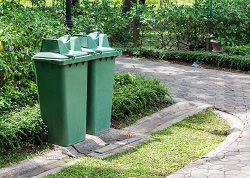Practical Advice for Unemptied Bins
Posted on 17/05/2025
Practical Advice for Unemptied Bins: What to Do When Your Rubbish Isn't Collected
Missed bin collections can cause inconvenience, unpleasant smells, and even pest problems. Understanding how to respond efficiently and prevent such situations in future helps keep your property clean and your community healthy. Explore comprehensive, practical advice for unemptied bins in this expert guide.
Understanding Why Bins Go Unemptied
Before diving into solutions, it's important to recognize common reasons for missed bin collections. Knowing the root cause can help you take the right steps and prevent similar issues next time.
- Incorrect bin placement (e.g., not at the curb or positioned wrong)
- Overfilled bins or lids not fully closed
- Contaminated recycling bins with non-recyclable items
- Incorrect collection day or schedule changes (such as due to holidays)
- Adverse weather - heavy snow or floods can delay waste collection
- Access problems, e.g., parked cars blocking collection trucks
- Missed by mistake - human error still happens
Bins not being emptied doesn't always signal negligence--often, a small oversight or unforeseen circumstance is to blame.

Immediate Steps to Take if Your Bin Wasn't Emptied
Check the Collection Schedule
The first step is always to verify your waste collection day. Councils may alter the regular schedules due to public holidays, strikes, or bad weather. Visit your local council's website for the latest updates, or review any posted notices or emails recently received.
Inspect Bin Placement and Contents
Ensure that:
- Your bin was at the correct location by the designated time (usually by 6 or 7 AM).
- The bin lid was fully closed (councils often refuse overfilled bins).
- Only appropriate waste was placed in the bin (e.g., general rubbish, recycling, or garden waste as specified).
Bins containing prohibited items (like electronics, batteries, or liquids) may not be collected.
Speak to Your Neighbours
Ask your neighbours if their bins were also missed. If the whole street or block was affected, it's likely a collection issue rather than a problem with your bin.
Reporting a Missed Bin Collection
Contact Your Council or Collection Service
If your bin hasn't been emptied and you've checked all obvious causes, the next step is to report the unemptied bin to your municipal waste service.
- Use the online form or app many councils provide for reporting missed bin collections.
- Some councils allow phone or email reporting - find the correct contact on their website.
- Report the issue promptly - within 24 hours is best for a quick resolution.
- Be ready to provide your address, bin type, and details about the situation.
Most authorities aim to address missed bins within a few working days, either by sending a crew back or adding you to the next round.
What to Do With Uncollected Rubbish
Store Waste Securely
- Keep the lid closed to deter pests such as rats, foxes, and seagulls.
- If there's too much rubbish, double-bag excess waste and store it safely until your next collection.
- Try to keep bags away from direct sunlight and well ventilated to minimize odours.
Reduce Future Waste Temporarily
For households facing a delay in collection, minimizing additional rubbish by being conscious of waste generation can help.
- Compost kitchen and garden waste separately, if possible.
- Avoid buying perishable goods you won't consume promptly.
- Recycle correctly to reduce general waste overload in your bins.
Dispose of Waste at Local Recycling Centres
If your missed bins result in large amounts of waste, check opening times for your local household waste and recycling centre. You may be able to bring bagged rubbish directly there, especially for general waste and recyclables.
Prevention: How to Avoid Missed Bin Collections
Follow the Bin Guidelines Strictly
- Put the bin out on time and in the correct location.
- Make sure the lid can close fully - if it won't, remove some rubbish.
- Separate recycling, garden waste, and general rubbish according to local rules.
- Do not include prohibited materials (food waste in recycling, bags in green bins, etc.).
Mark and Position Your Bin Clearly
Use house numbers or stickers so your bin can be identified, especially in communal areas. Place it so that it's visible and easily accessible to refuse collectors, but does not block pavements or roads.
Stay Informed About Local Changes
- Subscribe to council alerts (email or SMS) for schedule updates.
- Pay attention to leaflets, website updates, or local news, especially around holidays or severe weather.
Work With Your Community
If you live in a block of flats or share bins:
- Arrange a rota with neighbours for putting bins out and retrieving them.
- Report regularly missed bins as a group - it's more likely to be prioritized.
What If Your Bin Is Damaged or Missing?
Damaged Bins
- Broken lids, wheels, or cracks can result in collections being refused or waste being spilled.
- Most councils offer free or low-cost bin repairs or replacements--report issues online or via phone promptly.
Missing or Stolen Bins
- If bins are lost or stolen after being left out, notify your council for a replacement.
- Mark bins with your house number and postcode to deter theft or confusion.
Special Situations Involving Missed Bin Collections
Flats and Communal Living
- If communal bins are not collected, work with your property manager or landlord to report and resolve the problem quickly.
- Use recycling points in the area if the issue persists and communicate with fellow residents about proper usage.
Accessibility Concerns
- If you or someone in your household has mobility issues, inquire whether your council offers assisted bin collection services.
- These services ensure bins are collected from a spot more suitable to your needs, helping avoid missed collections due to placement issues.
Common Mistakes That Lead to Unemptied Bins
Mixing Waste Types
One of the chief reasons for uncollected bins is contamination. For instance:
- Food waste mixed with recycling renders it unrecyclable.
- Placing plastic bags in green bins (for garden waste) is usually forbidden.
Overfilling or Excess Waste
Bins with raised lids or side waste may be refused; only bag extra non-recyclable rubbish if the council allows.
- Order an additional bin or book a bulky waste collection if your family generates high levels of waste.
Dealing With Odours, Pests, and Hygiene With Unemptied Bins
Combatting Bad Smells
- Wrap strong-smelling items, like food scraps and nappies, in extra bags.
- Sprinkle bicarbonate of soda in the bottom of bins to absorb smells.
Preventing Pests
- Ensure bin lids are tightly closed at all times.
- Keep bins clean--wash them with a mild disinfectant after each emptying.
- If pests become a problem, report it to council environmental health.
Keeping Surroundings Clean
- Pick up any spillage promptly--don't let litter accumulate around your property.
- Double-bag particularly dirty or decomposable waste materials.

FAQs: Common Questions on Unemptied Bins
What if my bin is missed regularly?
Regularly unemptied bins usually point to an underlying issue, such as poor access, routine contamination, or overfilled bins. Keep records of missed dates and contact your council with comprehensive details--they often review frequent problem areas for improvements.
Can I leave extra rubbish next to my bin?
Generally, no--most councils only collect waste that fits inside the provided bins, unless there's a special arrangement. Leaving extra bags could result in fines. For more waste, book a bulky waste collection or take items to a recycling centre.
Can I hire a private rubbish collection?
Yes, some independent waste services collect household rubbish or recycling for a fee. Always choose a licensed company to avoid illegal dumping.
Is it safe to share bins with neighbours?
If you both have excess space and waste type matches, it's fine for a short period--just ensure bins aren't overfilled and agree on how to use them.
Conclusion: Stay Proactive and Prepared
Dealing with unemptied bins can be frustrating, but following the right steps ensures the problem is swiftly resolved. Always double-check collection days, keep bins compliant, and if a pickup is missed, report it fast.
Prevention is key--adhering to guidelines and staying informed gives you the best chance of smooth, uninterrupted waste collection. If problems do arise, now you're equipped with practical advice on storing, reporting, and managing your rubbish until the next collection day arrives.
Keep your surroundings hygienic, your community happy, and your home free from avoidable bin hassles--put these tips for practical advice for unemptied bins into action today!
```
 020 3859 5580
020 3859 5580 020 3859 5580
020 3859 5580





 House Clearance
House Clearance Rubbish Collection
Rubbish Collection House clearance in London has never been easier, as Junk Removal Services can take care of your every need. From individual house junk...
House clearance in London has never been easier, as Junk Removal Services can take care of your every need. From individual house junk... With Junk Removal Services you can be confident that you’ll receive the most professional and affordable rubbish collection service within the London...
With Junk Removal Services you can be confident that you’ll receive the most professional and affordable rubbish collection service within the London...




